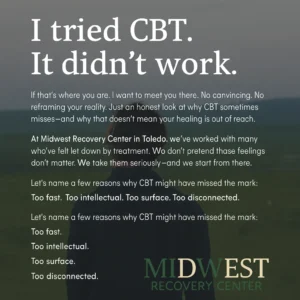You showed up. You were willing. You even gave it a real shot.
Maybe you tried CBT because someone told you it was “evidence-based” or “what works.” Maybe you went into it cautiously optimistic. Or maybe you were just tired enough to try anything.
But then it didn’t land. It felt too clinical. Too surface. Too… robotic. And now you’re left with the thought:
I tried CBT. It didn’t work.
If that’s where you are, I want to meet you there. No convincing. No reframing your reality. Just an honest look at why CBT sometimes misses—and why that doesn’t mean your healing is out of reach.
At Midwest Recovery Center in Toledo, we’ve worked with many people who’ve felt let down by treatment. We don’t pretend those feelings don’t matter. We take them seriously—and we start from there.
When CBT Feels Like a Letdown
Here’s the truth: not all CBT experiences are equal.
Some sessions are rigid. Some therapists don’t hold space for your emotions before jumping into “homework.” And some programs push CBT like a one-size-fits-all solution, forgetting the human on the other side of the worksheet.
So when you say CBT didn’t work, I don’t assume you didn’t try hard enough.
I assume something about the way it was offered didn’t connect with you.
You Weren’t Wrong to Want More
CBT is often delivered like a tool for fixing broken thinking. But when someone is in pain—grieving, traumatized, ashamed—they don’t want to be “fixed.”
They want to be understood.
And that’s where CBT sometimes falls short. Not because the method is flawed, but because the delivery skips the part where we slow down and connect.
You weren’t asking too much. You were asking for something that fit your experience.
CBT Isn’t a Personality Test—It’s a Framework
If your experience felt too clinical or sterile, it might be because CBT was used without enough flexibility.
But CBT itself isn’t cold. It’s neutral. It becomes whatever the therapist brings to it.
CBT is like a blank stage. In one hand, it can feel like a script. In another, it can be a space to improvise, feel, stretch. It all depends on whether the person guiding it can tune it to your rhythm.
So when we say “try CBT again,” we don’t mean: repeat what didn’t work. We mean: try it with someone who sees you first, and the framework second.

Why It Might Not Have Landed the First Time
Let’s name a few reasons why CBT might have missed the mark:
- Too fast. Jumping to thought tracking before trust is built feels abrupt.
- Too intellectual. Some people live in their heads already; they don’t need more logic—they need felt safety.
- Too surface. Identifying thoughts is useful, but not if we never ask why those thoughts exist in the first place.
- Too disconnected. If the therapist didn’t listen, the method won’t matter.
If any of that feels familiar, know this: the problem wasn’t you.
The Right Version of CBT Feels Different
When CBT is paced well and delivered with care, here’s what it can actually do:
- Help you name patterns that have been invisible for years
- Slow down spirals so you can choose instead of react
- Offer real skills for managing self-doubt and overwhelm
- Unpack old beliefs about yourself, your worth, your safety
- Teach your brain new ways to respond—without bypassing your heart
This version of Cognitive Behavioral Therapy Program in Ohio doesn’t shame you for struggling. It honors that your strategies once kept you safe. Now, it asks: what could safety look like now?
A Client Story: “I Thought I Was the Problem”
Elijah had done CBT in college after a panic attack. It helped him keep going to class, but not much else. “It felt like symptom management,” he told me. “And I thought that was all I could get.”
When he came to Midwest Recovery Center, he almost didn’t want to try again. But we approached it differently.
Instead of starting with symptom logs, we talked about his life—his values, his fears, his shame. We looked at how his thoughts formed in context, not isolation. And we tailored the tools to match how he actually processes emotion.
A few months in, he said, “This doesn’t feel like CBT. It feels like you actually know me. Like we’re building something, not patching holes.”
That’s the version we aim to offer. One that fits your life, not just your diagnosis.
You’re Allowed to Be Skeptical—and Curious
You’re allowed to carry the weight of past therapy that didn’t help. That wasn’t your fault. You’re allowed to question whether anything could work better. That’s not negativity. That’s honesty.
But maybe, alongside that skepticism, you can hold a little curiosity:
- What if CBT didn’t fail me—what if I haven’t yet seen what it could be?
- What if I needed more space to feel before I could change?
- What if this time, I don’t have to do it alone?
Those questions don’t require commitment. Just openness. And that’s enough to start. Living in Maumee, Perrysburg, Oregon, Ohio, or Lambertville, Michigan? Midwest Recovery offers programs built on that same supportive approach.
FAQs: CBT for the Treatment Skeptic
I tried CBT and it felt like homework. Is there a way it can feel more human?
Yes. A skilled clinician will prioritize relationship-building first. When CBT is customized to you, it feels like insight, not assignments.
What if I don’t trust therapy anymore?
That’s a valid feeling. At Midwest Recovery Center, we’ll work with your pace. You don’t have to perform trust. You just have to show up, and we’ll honor where you are.
Is CBT flexible enough for trauma or complex history?
Absolutely—especially when it’s trauma-informed. CBT doesn’t ignore the past. When done well, it gives you safe ways to make sense of it and live differently.
What if I don’t want to do worksheets?
Good news: therapy isn’t school. CBT can involve conversation, metaphors, visualizations—whatever resonates with your style of learning and reflection.
How do I know this time will be different?
You don’t. But if we start with you, not the method, we can co-create something that feels less like a program—and more like a path forward.
Final Thought: “It Didn’t Work” Doesn’t Mean It Can’t
If your last experience with CBT felt cold, shallow, or frustrating, your reaction makes sense. You’re not broken for needing something deeper. You’re human.
Trying again doesn’t mean you’re naive. It means you still believe you’re worth finding what works.
And you are.
Ready to try CBT differently this time?
Call (888) 657-0858 or visit our CBT services in Toledo, Ohio to see what’s possible when therapy actually meets you where you are—without pressure, without judgment, and without doing it the old way again.


























